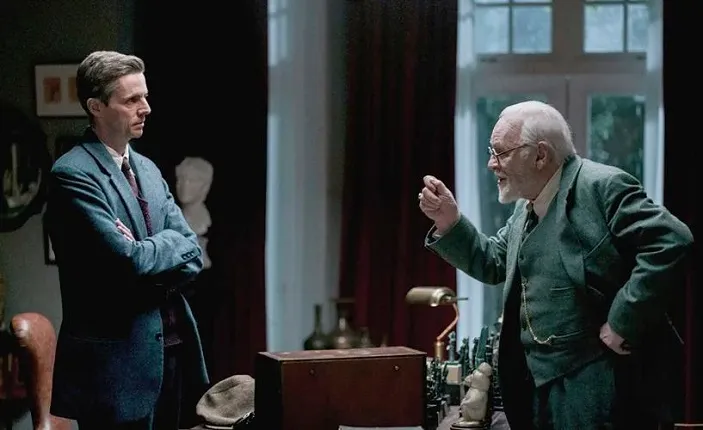A debate of towering significance between two eminent thinkers; “FREUD’S LAST SESSION” | FILM REVIEW
If you’ve wanted to be a fly on the wall for a conversation in a theological vein between Sigmund Freud and C.S. Lewis, the playwright Mark St. Germain brings it to the stage in “Freud’s Last Session,” now a film directed by Matt Brown (“The Man Who Knew Infinity”).
Anthony Hopkins achieves yet another pitch-perfect performance as Sigmund Freud, burned by the spread of fascism across Europe, and now living in exile in London. Matthew Goode is Lewis, scarred by his time in World War I and dealing with severe unease as the Nazis prepare for a second. However, though both he and his friend J.R.R. Tolkien (Stephen Campbell Moore) were scarred by what they saw and did in the trenches, Lewis has come to rely on his religious faith as a balm for his wounds and those of the damaged world around him. Freud, on the other hand, is both a staunch atheist and a Jew—though certainly an intellectual equal for Lewis.
Thus, the two men exchange on God’s existence, morality and purpose. Much of their dialogue happens in Freud’s office, where the doctor is helped in his dotage by his daughter Anna (Liv Lisa Fries), who hides a secret that would surprise but probably not shock her father. As the BBC reports on Germany’s plans to invade first Poland and, later, the United Kingdom, Freud and Lewis argue vociferously yet with a profound respect for the other. Freud, who has endured the horror not only of antisemitism but also of an overbearing, loveless Austrian father (as seen in flashback), sees Lewis’s insistence upon the divine as naive, even childless. Lewis, the military veteran, has turned his trauma into the creation of a fantasia called Narnia. (His friend Tolkien, of course, turned his ennui into the birth of Middle-earth.) Perhaps, he thinks, Freud’s lack of faith is a lack of imagination.
Such is the prowess of Goode and Hopkins that the film could have been entirely contained on the one set of Freud’s office, but as this is a movie, digressions into the characters’ pasts and the anxious streets of 1939 London are included. We see Anna teaching at university, struggling to win the respect not only of her male colleagues but also of her male students—all of whom are White and from prominent families. Her father might not have been a true Marxist, but doubtless, he would have had much to say about the entrenched class structure at work, as well as its effects upon sex in English society.
But it is ultimately the desires, many of them sublimated, within Lewis and Freud that form “Last Session” ‘s heart. Freud, his body wracked by age, is fond of a hit of morphine to dull the pain. At the same time, Lewis finds a rather unlikely balm for his scars in the presence of his deceased war buddy’s mother—which almost sounds like the punchline of a psychoanalytic joke and thus is catnip for his Austrian friend.
Thanks to the cinema, Brown can visualize these past traumas and wounds rather than simply having his actors talk about them. It’s a bit of a distraction to suddenly see unknown younger actors as the youthful iterations of our two leads, but cinema all but requires such trips away from the psychologist’s office. All the same, we are grateful when the camera returns to Goode and Hopkins in repartee.
Fries as Anna Freud is exquisitely cast and holds her own as the least-famous of the main characters. She stands in perhaps for all of the unheralded women on the island of Britannia who supported the war effort to victory. An intriguing postscript informs us what became of Anna following the war. It is also a reminder of how difficult life must have been at the time for people of a different persuasion.
Given the limits of their settings, plays turned into movies can be a challenging subgenre, but the one-two punch of Hopkins and Goode portraying two of the most famous thinkers of the time holds our attention throughout this brisk film. We will never know if anything said in “Freud’s Last Session” happened, but its “truth” feels precisely right.
Now playing.
news via inbox
Nulla turp dis cursus. Integer liberos euismod pretium faucibua



